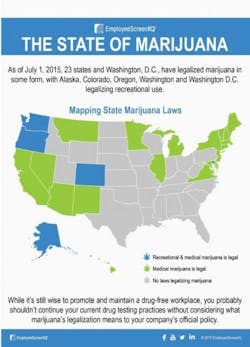Even where it’s legal, marijuana still a drag for truck drivers
An unprecedented shift is taking place around marijuana, with four states and Washington, DC, now allowing recreational use of the drug by adults 21 and older. What does this mean for commercial fleets' operations, which already face big challenges recruiting and retaining drivers — the same drivers who must follow federal law?
Oregon is the latest of a handful of states to legalize recreational use of marijuana — some 23 states allow medicinal use — as of July 1. Getting caught up in the moment cost one trucking company a good employee, says Ruth Kenney, safety and compliance specialist at the Oregon Trucking Assns.
“I do know of a company that has had some fallout with recreational use,” she tells Fleet Owner. “They had one driver who just barely, barely tested over the limit.”
The driver wasn’t a habitual user, Kenney notes, “just someone who got caught up over the Fourth of July holiday and decided to participate” with others. Adults in Oregon are now permitted to use pot recreationally under restrictions similar to those applied to alcohol as long as it’s not in public.
The driver, however, happened to be selected for a random drug test, and failed it because he had more THC — the active ingredient in marijuana — in his system than legally allowed, according to Kenney. “With the company’s zero-tolerance policy, they lost a long-term employee over it,” she says.
In an industry where driver turnover at both large and small commercial fleets only recently dropped below 90%, according to the American Trucking Assns., the loss of even a single driver who follows the old adage, “When in Rome…,” can hurt a fleet. Certainly, one inevitable consequence of marijuana legalization is that the drug will become more available, leading to increased chances for a driver to have a lapse in judgment.
For truck drivers living in or passing through Oregon, Colorado, Washington and Alaska, for instance — the four states to date that have legalized recreational use — the social acceptance of marijuana could become similar to that of alcohol, as in “having a few beers.” As long as a commercial driver is off duty, he or she can consume alcohol in accordance with the law.
A driver can, however, be randomly tested for alcohol when going on duty or just coming off the job. If his or her blood alcohol content (BAC) tests equal to or greater than 0.04%, the driver is considered unfit to drive. Unlike marijuana, alcohol metabolizes quickly in the body, and BAC is more easily linked to both time of consumption and degree of impairment.
The U.S. Dept. of Transportation’s current required drug test method is urinalysis, which can detect pot long after a driver has stopped feeling the effects of it. And DOT has not wavered in its position regarding marijuana use of any kind — medical or recreational — since states began legalizing the drug.
State-federal divergence
Marijuana as a popular issue is similar to the path gay marriage has taken since the turn of the millennium, with individual states blazing their own trails and making allowances the federal government specifically did not. For its part, the federal government lists marijuana as a Schedule I drug under the Controlled Substances Act, recognizing neither medical nor recreational use as legal, although the federal government has stepped back from prosecutions for marijuana use that’s in accordance with local law.
DOT addressed medical use of marijuana in 2009 and recreational use in 2012, in each respective case following major state initiatives legalizing those uses, and DOT has since noted that its position has not changed.
DOT states unequivocally, “We want to make it perfectly clear that the state [marijuana] initiatives will have no bearing on the Dept. of Transportation’s regulated drug testing program.” DOT further notes that its testing regulation “does not authorize medical marijuana under a state law to be a valid medical explanation for a transportation employee’s positive drug test result.”
The bottom line, at least as far as the federal government is concerned: “It remains unacceptable for any safety-sensitive employee subject to drug testing under the Dept. of Transportation’s drug testing regulations to use marijuana,” DOT states, and that list includes commercial truck drivers, train conductors, airline pilots and others.
Responding to changes
While not advocating any view or policy of the Oregon Trucking Assns., Kenney wonders if states' changes may lead trucking companies to examine their zero tolerance policies going forward. “I suspect what’s going to happen is they may find themselves wanting to look at their policies of zero tolerance and make an adjustment” to allow some forgiveness or slight leeway, she tells Fleet Owner.
The federal guidelines, though they don’t specifically call for a zero tolerance policy on pot, are very explicit and don’t allow much wiggle room. Truck drivers and other covered transportation industry workers who test positive for marijuana in random drug and alcohol testing — or a test given in other instances such as after an accident or when there’s reasonable suspicion of impairment — must be removed from operating safety-sensitive equipment, and can’t return until they complete a DOT-required return-to-work program.
Kenney says she expects to see testing methods emerge that will attempt to measure or focus on a driver’s immediate impairment from marijuana, perhaps similar to how a breathalyzer can detect BAC. But because current testing detects simple presence of the drug, which remains in the person’s system for a longer period, the trucking industry might even serve as a catalyst for the federal government to address marijuana law, she points out.
|
“They’re going to have to make that lifestyle choice between a career as a commercial driver or participating in recreational use.”—Ruth Kenney
|
Anecdotally, “what we’re hearing from members is everybody’s expecting that this is going to be played out in the court system,” Kenney says. “Someone will be terminated post-accident for testing positive for marijuana, and they’ll say they weren’t impaired.”
“Then it’ll be an issue for the higher courts to decide,” she adds.
Fleets operating in states that have recently or are now considering legalizing recreational marijuana use may face the toughest challenges. In Oregon’s neighboring state of Washington, recreational use of the drug has been legal since 2012, so there’s been some time for adjustment. There, commercial drivers apparently have few illusions about how marijuana laws apply to them.
“It’s well known that our industry falls under federal law,” says Mike Southards, director of safety at the Washington Trucking Assns. “I’m hearing very, very little about any impact from changes in marijuana law, and very, very little on any influence in new driver applications,” he adds.
“I think it has been drilled into drivers for so long, they all realize they still fall under federal law,” Southards tells Fleet Owner.
Kenney agrees, noting there will likely have to be a change at the federal level for any significant shift to occur in the way trucking companies treat marijuana use. “Until the federal government changes its stance on marijuana, those applicants who test positive are going to get screened out,” she says.
“They’re going to have to make that lifestyle choice between a career as a commercial driver or participating in recreational use,” Kenney continues.
Medicinal use also could help drive legal consideration of the federal position. A driver could get medical access to marijuana and end up in the same post-accident scenario, where the driver tests positive but claims he or she was unimpaired by pot at the time.
Courts and employers' rights
For now, though, fleet operators can gain some insight from industries outside trucking. Even when an alcohol- and drug-free workplace policy isn’t a requirement, businesses and organizations have been able to set and enforce those policies, and there are a variety of reasons for doing so, notes one employee screening company.
Among employers in general, for example, some in places where medical or recreational use of marijuana is permitted notably have tightened up their policies on pot, according to EmployeeScreenIQ, a background and substance abuse screening provider based in Cleveland. The company states that in Colorado, which legalized recreational use of marijuana in 2012, employers have been able to continue to enforce drug- and alcohol-free workplace policies that ban marijuana — again, particularly because the federal position on marijuana is unchanged.
“Colorado law prohibits an employer from terminating an employee ‘due to that employee’s engaging in any lawful activity off the premises of the employer during nonworking hours,’” EmployeeScreenIQ states in the white paper. "However, in Curry v. MillerCoors, a Colorado District Court ruled that the protected activity had to be lawful at both the federal and state level."
Further, EmployeeScreenIQ points out, “Courts have generally ruled that employers may fire workers for using pot, even off-duty and if medically prescribed.” And whether or not marijuana is legal in a given state, employers have other things to consider when it comes to use of the drug, such as the negative perception clients may have of it.
“Legalization doesn’t remove the many reasons for marijuana screening, which include workplace safety, productivity and health concerns, limiting health insurance costs and protecting your company image,” EmployeeScreenIQ states.
About the Author
Aaron Marsh
Aaron Marsh is a former senior editor of FleetOwner, who wrote for the publication from 2015 to 2019.

